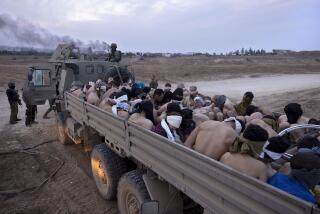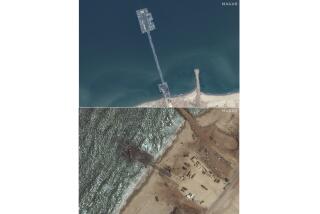Disabled Arabs, Israelis Find Peace at Sea of Galilee
- Share via
TABIGHA, Israel — The patch of beach on the Sea of Galilee where Jesus is believed to have performed the miracle of the loaves and fishes has become a sanctuary from the violence of the Arab-Israeli conflict.
Palestinian activists wounded in the nearly yearlong uprising against Israel live side by side in Tabigha with handicapped Israelis and German volunteers.
“In this place there is no room for violence,” said Johannes Roelofsen, a West German social worker who four years ago founded the Tabigha resort for the handicapped nestled amid palm trees and flower beds on the northern tip of the Sea of Galilee.
“The spirit of the place is still present, a place where all of a sudden 5,000 people became a community,” he said, referring to the New Testament account of the miracle in which Jesus fed 5,000 with five loaves of bread and two fishes.
Roelofsen, a large bearded man from Wissen an der Sieg in West Germany, spoke in Tabigha’s outdoor dining area where Palestinians in wheelchairs and young German volunteers sat around large wooden tables, noisily sharing a simple rice dish.
“The intifada (Palestinian uprising) is making us all a little crazy. Here we can have some fun and forget what’s happening in the West Bank,” said one of the diners, Hassan Dahdouh, a 24-year-old laborer from Nablus on the West Bank whose right leg has been rigid since being shot in the knee during a clash with Israeli troops in March.
Tabigha and the adjacent Church of the Multiplication of Loaves and Fishes are administered by the Roman Catholic Benedictine Order and financed by donations from around the world. Handicapped guests stay free, sleeping in simple huts and helping with the chores.
After the first victims of the uprising began to arrive, Roelofsen recruited an Israeli physiotherapist, Daniela Epstein, to set up exercise routines. He said hospitals in the occupied lands don’t provide rehabilitation programs.
Epstein, a volunteer, said many Palestinians were initially surprised to be treated by an Israeli but quickly settled into a work routine.
One of her patients is Akram Muktassab, a 23-year-old paraplegic from Hebron on the West Bank who was shot by Jewish settlers last year. He was using a wheelchair until he met Epstein who taught him to walk along parallel bars, his legs encased in plaster casts.
“He was very excited when he took the first steps,” Epstein said. “He cried. He couldn’t believe he could do it.”
Muktassab said meeting Epstein helped him get over the hatred he felt for Jews after being wounded.
“Daniela is Jewish, but she helped me,” said Muktassab, his muscular arms resting on his withered legs.
Other Palestinians are less conciliatory.
“I want to take revenge, and build up my arms so I can throw stones again,” said Amer Albasha, 24, a tailor from Nablus who has been walking on crutches since April when, he said, he was beaten unconscious while in army custody.
Albasha spoke while sitting on the floor with his legs stretched out and pushing up his lower body with his arms. The exercise was designed for him by Epstein.
“This is certainly not my intention,” Epstein said in response to Albasha’s remarks. “But Palestinians also have a right to rehabilitation, regardless of politics.”
Roelofsen, 39, said that when handicapped Israelis and Palestinians first meet at Tabigha, they are usually suspicious of one another and sometimes get entangled in political arguments.
“But after a while, the handicap becomes more important,” he said. “They talk about where you can find the best wheelchairs.”
More to Read
Sign up for Essential California
The most important California stories and recommendations in your inbox every morning.
You may occasionally receive promotional content from the Los Angeles Times.













